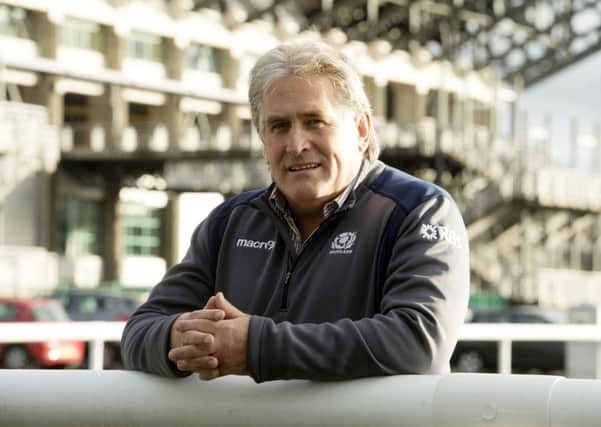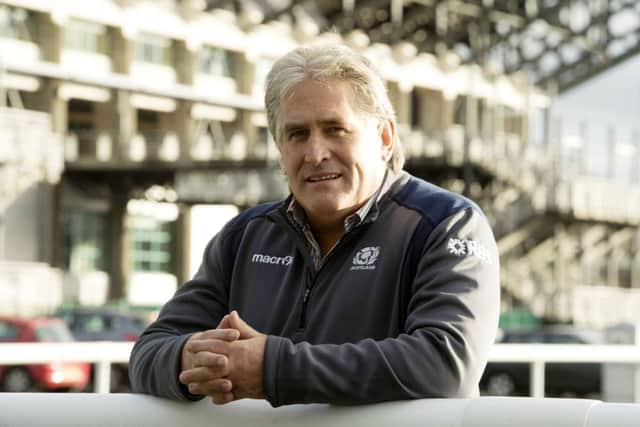Scott Johnson ready to surf a sporting tidal wave


The Australian will step down as head coach in May when Vern Cotter finishes as Clermont Auvergne chief and, a year after being appointed, takes over the reins at Murrayfield. Cotter was due to join the Scotland squad this week for a brief visit while French rugby is off, but Johnson revealed yesterday that he would not now be coming due to a family issue.
He may come later in the tournament, but Johnson insisted that it was merely to gain understanding of what the squad was doing and capable of, rather than wielding any influence.
Advertisement
Hide AdAdvertisement
Hide AdBut the key for Johnson in his final Six Nations as chief is the perennial challenge that has faced every Scottish coach, in most sports – how to unearth a consistency that makes the team competitive in every game. Launching a year in which Scotland hosts the Commonwealth Games and Ryder Cup, Johnson said he did not feel under any more pressure than usual to start with success, but agreed that the heightened focus on sport could help the team.


“I don’t think it’s extra pressure,” he said. “It’s a benefit. You ride a wave, don’t you? You like to get drawn into it and people get confident. There are good stories to tell there. It’s fantastic.
“Everyone looks at the negatives. In life, you hear the negative more often then the positive, but the positive stories coming out about the success the nation has had are a great story. It shows Scottish lads that they are no different, no different to any other kids. That’s one of the things I tell Scottish kids when I speak at schools and things. I say ‘you are no different – no better and no worse. If you try hard and train hard you’ll be as good as anyone’.
“I’m happy to get my surfboard out and ride on the back of that wave.”
Speaking at the launch of the 2014 RBS Six Nations in London, Johnson deflected questions over how many wins Scotland could achieve or what position he hoped they would occupy at the tournament’s finish. The key target he has set the players is to be competitive enough in the first hour of every match that they are still firmly in the game in the final quarter. Then, he said, he would be confident that they could beat any opponent.
“I can categorically say that they [other nations] are not fitter than us. I’m not saying we’re fitter than them, but no-one stands out as fitter than us, and I’m happy to say that. We are going in with equal armoury there.
“There are a lot of teams will look at Scotland as a must-win game in this tournament. But if we are in games with 20 [minutes] to go then watch the pressure start. We’re happy about that because our 20-minute game is a pretty good one.”
The query then is how good the first 60-minute game may be, with last year’s campaign being undermined by a 38-18 defeat to England – Scotland were 31-11 down before 60 minutes – in the opening match.
Advertisement
Hide AdAdvertisement
Hide AdGlasgow suffered in the recent Heineken Cup with good and poor first hours and a lack of accuracy in final quarters in different games, while Edinburgh’s battle with consistency, albeit expected under new management, remained the key barrier to achievement in their pool.
One reason that Andy Robinson brought the Australian to Murrayfield was a desire to see a different sporting psychology brought into the Scottish game, a new approach to skills training and a fresh mindset from a man born and bred in a country where winning is everything.
So does Johnson feel he is getting somewhere or is Scottish rugby still being held back by an inferiority complex?
“It is not unlike when I had the team in Wales,” he said, reflecting on the periods he spent assisting Wales coaches Graham Henry, Steve Hansen and Mike Ruddock from 2001 to 2005, and which laid the foundations for the recent run of success.
“Winning is contagious and once you start to get on a roll then you start to believe you can do things. You’ll knock on the door a few times and when it doesn’t open you’ll get a bit disconsolate, but you just have to work through that.
“Once you get one there is a belief. It’s no coincidence that Wales had that in the early 2000s that carried them through. Young kids see what they can do, but you have to put yourself in the competition. You have to learn how to do it, but we have the gifts to do it. We’ve just got to do it more consistently.
“I don’t think it’s a lack of belief. It’s a lack of experience, the experience of doing it. You have to learn to take opportunities. What is constant around the world in every team is that when you look at the opposition you think ‘gee, they’re big’. Both coaches and both sets of players are saying the same thing because you can’t see yourself.
“We have to learn that we are big and that comes with experience. Once you have that you’ll get a run of success. Once we get across the line we’ll be fine.”
Advertisement
Hide AdAdvertisement
Hide AdAsked whether he felt Scotland could contend for the Six Nations title, he tried to strike a balance between backing his players and the reality of the respective strengths of the squads heading into this tournament.
“The country that we are, and where we are as a squad,” he responded, “we’re not quite with the big boys yet. We’ve not got ample player resources to pick from. We’re still building a squad and a team.
“We’ve got to get more consistent performances. I see glimpses of our game and I think we can compete with anyone. We just want to do it for longer. If we do that and we are competitive in every game then there is growth in our team.
“Last year was reasonably successful, but we weren’t competitive in the first game [against England]. I keep saying to the players that there are two games in a game of rugby, especially for a team like Scotland.
“There’s the first 60 minutes, and if you’re still in the competition at that point then there is scoreboard pressure. It suits us. We have to be in the competition at 60 minutes in this tournament, and if we can do that in all five games then we will have a pretty good Six Nations.”
That will probably be true.
SEE ALSO